Tughoz – Aliboy Family Aliboy family
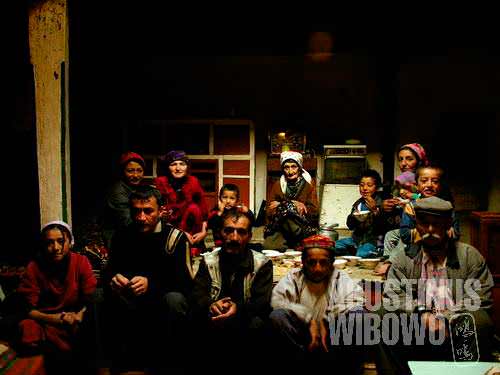
The Aliboy family
His name is Tuloev Aliboy Jumakhanovich, an unemployed man who sometimes work as driver, 33 years old.
He greeted me, “We, Ismailis, dont go for hajj in Mecca. We dont waste our money for hajj. But our leader says, providing shelter and food for poor traveller, the mosafers, that is our hajj pilgrimage.”
That is the reason of the hospitality of the Ismailis. No matter that there is no even wheat to make bread, being hospitable to a guest is compulsory. Aliboy sheltered me in his traditional house. There were his old father, Jumakhan, 72 years old, the old mother, sisters, cousins, and children in his little house. People of the Pamir are said to have long ages, like Jumakhan’s grand father who lived until 120 years old of age. Maybe it was because of the pure water. Aliboy had no job, even though he had a car. Here we could observe how live reduced dramatically to its modest form since the breakaway of the USSR. From a car owner to be an unemployed whou couldnt sustain sufficient income for basic needs, life have never been easy afterwards.
The situation in Tajikistan was much worsened by the Civil War. But every Badakhshanis was thankful to the great spiritual leader, the Highness Aga Khan, who provided a new life in this almost died area due to the complete isolation. “When we had civil war, Aga Khan Foundation provided us everything: oil, wheat, rice, sugar, milk,…., it’s just everything. It was about 10 kg, even 20 kg per person. So imagine, that if a family had 10 people, they cuold get 200 kg or even more, per month!”. But as life had turned better now, the aid had been reduced to be only 2 kg per quarta (3 months) now. Nevertheless, it was still Aga Khan who provided life here.
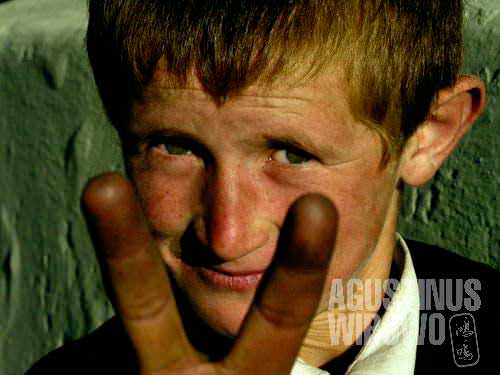
A Tajik boy from Tughoz, with blond hair and blue eyes. Many people here have European physical features.
During the civil war, life was bad, that many people turned to Afghanistan to get food supply and shelter. But in 2001, the situation in Tajikistan was much stabile, and Aliboy was among the luckiest to get a job as truck driver to send food aid to Afghanistan. He mentined some big organization names he used to work with, like Aga Khan Fondation, WFP and Red Cross. At that time in Tajikistan, the only people with job were mostly drivers.
Talking about the glorious past, Juma Khan liked the Soviet very much. He mentioned, among the modernization, it was the Russian who stopped the opium culture in Wakhan valley. Before the Soviet occupation, the opium was consumption of the people in both sides of the river, but the Soviet then punished the drug users and traffickers, and brought a fullstop to this side of the river. At the isolated Afghan side there, opium was still a rampant social disease, even until today.
As the national presidential election was coming, I was also curious about what people thought and also about their hope in the coming election. “What election! This president will be president again. This is for sure. The first election was in 1992. In 1994 we had election which Rakhmanov became president. The constitution said we would have election every 5 years so we had second election in 1999. He changed the constitution again, that election (intikhobot) will be every 7 years, that will be this year!” How about Aga Khan who was going to visit GBAO at the end of this month together with the president? “Aga Khan is not political. People know that. He just comes to innaugurate the bridges with Afghanistan, nothing more. I am also not political, but I dont think people here will consider Imamali Rakhamanov is connected with the Highness.” Aliboy had seen aga Khan twice, in Ishkashim and Langar, in Aga Khan’s previous visits, and now he wished to see the adored man for the third time.
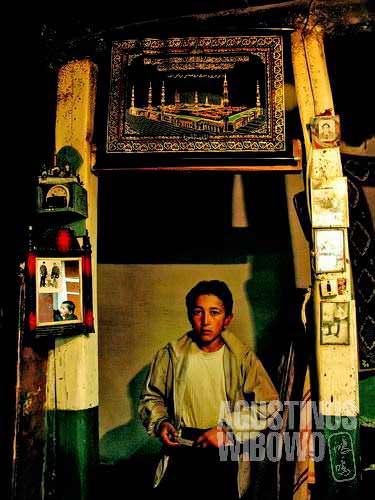
Bazarboy inside the traditional Pamiri house
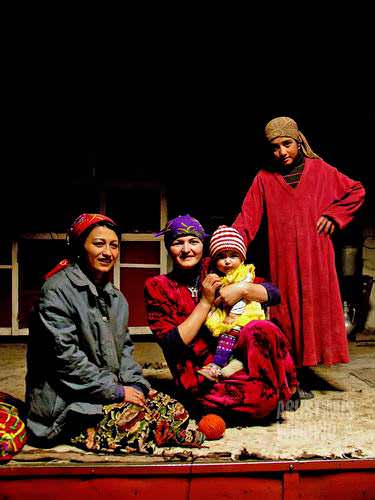
The women of the family
Aliboy’s house was very traditional, but still much more modern compared to those in Afghanistan side of the river. From this river side, I could see Khandud at the AFghansitan side. The village of Tyghoz is opposite the village of Izzyk in Afghan side, and 2 km upper there are Yamg in Tajik side and Khandud in Afghan side. When I saw Khandud far away from here, all of my memories of the village were replayed again in my mind: about those fanatic Sunni traders from Afghan Ishkashim who asked me why I didnt perform namaz. The river had shrunk in winter. What was majestic 100 m wide river now turned to be small streams. But life of the two sides of the river were not only separated by time dimension, but also by mind evolution.
Almost vertically beyond Tyghoz through the steep hills, there was the meain attraction of the area: The Bibi Fatima spring, which is believed to bring fertility to the pilgrims. Aliboy asked his nephew, Bazaarboy, to accompany me. Bazaarboy was 16, but he looked much younger. The mountain path was for sure not for me, so the small boy helped me a lot in climbing the steep cliff through donkey paths up till Yamchun fort (curiously had a Chinese-like name). About 2 km away, there was the hot water spring, where men and women came for a dip. I went to male’s section and saw boys swimming without wearing anything. I just realized today was Eid-ul-Fitr, the day marking the end of the holy month of Ramazan, and always a big festival for the Muslims. Bazaarboy had 1 day holiday from the school, so he went with me to the spring. But hou could I fail to recognize Eid earlier? I was now living in Ismaili Muslim populated area, where most people didnt observe even fasting. I often forgot now was Ramazan since I entered GBAO as I, as other people, ate and drunk freely during the days. Many people said fasting 9 days in the month was enough, but many others just didnt bother to do it at all. “I dont have time,” said Fakhriddin, a student of English faculty in Khorog’s University of Central Asia. For many, fasting was just time wasting.
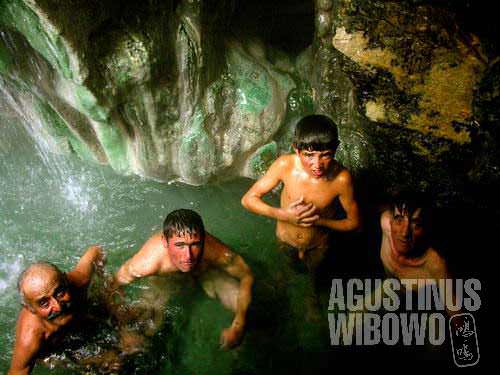
Naked, warm, wet, and hey… Eid Mubarak!
For Ismailis, of course Eid was still an important day. They celebrated one day earliar than the Sunni majority, and it was limited to family matter. The most significant activity was visiting graaves of ancestors and relatives. No mass prayers nor dance celebration. Eid just passed, almost missed by me, in the Wakhan Corridor where the Tajik Ismaili lives. It was a normal holiday, where boys like Bazaarboy and other people from nearby villages went to hot spring for a nice hot shower. It was just a one day off, not more than that.
“Eid Mubarak!” the men screamed to me from inside the pool.
Eid Mubarak!



Leave a comment